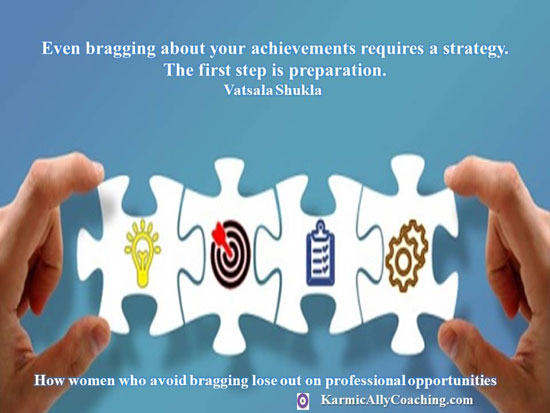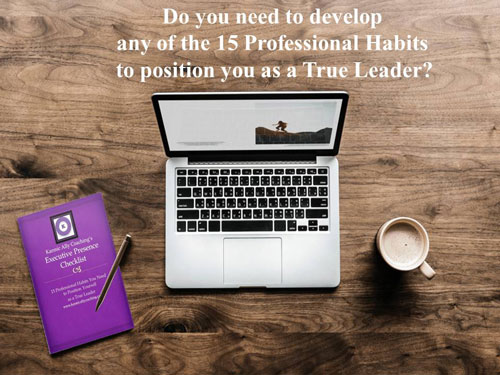This post has already been read 917 times!

Why do highly competent working women sometimes develop issues with bragging about their work? Or take credit for a job well done with pride instead of discomfort?
Is it societal or cultural norms that require demureness, lack of confidence or being labeled aggressive that stops them from even a spot of justified self-promotion?
I feel all of the above apply but from personal experience I believe there is also an element of gender bias in the workplace.
As a trailblazer who became the CFO of a NYSE listed insurance company by the age of 30, it was but natural my work experience would have developed my self-confidence.
I had no issue mentioning my achievements in my resume because I hadn’t been taught otherwise. However, it became a challenge when I returned to India the first time and couldn’t get a job commensurate with my experience.
I had the qualifications and credentials for the vacancy and got the interviews. All went well but I didn’t get the job offer.
My father and I visited a university time friend of his who was highly networked in the corporate world. We wanted to work out where I was going wrong in the Indian job market.
The answer was clear. I was instructed to tone down my resume, hide the very accomplishments that made me a viable candidate and appear less confident in my interviews.
As my Dad’s friend put it, my job was to get the job, not make the male interviewer feel threatened by my accomplishments. I could demonstrate Executive Presence later.
Fortunately, I didn’t have to do that. My Executive Recruiter spoke to a multi-national company Finance Director about me for a vacancy they had mandated.
Unknown to me, she casually mentioned the challenge I was facing.
The Finance Director liked the resume and invited me for an interview. He hired me on the spot for the project that required my skills at a handsome salary. Wow!
As he told me later, he’d witnessed this gender bias during his years in India, but this company was an equal opportunity employer. I got the job on merit and didn’t have to worry about being demure.
This is an exception to the norm. Confidence can sometimes backfire when it comes to climbing the corporate ladder.
And it isn’t just a specific geographic phenomenon; it’s global even though some countries are ahead in gender parity employment.

The interplay between gender, confidence and job promotion prospects
I read about an interesting study done back in 2018 in Australia on this topic.
It challenged the prevailing assumption that the best way to improve gender equality in the workplace was to encourage women to become more assertive.
This study indicated that popular approaches like the “lean in” movement championed by Facebook executive Sheryl Sandberg could be misguided. It might just backfire.
This research for the first time offered a comprehensive view of the interplay between gender, confidence and job promotion prospects.
Researchers measured confidence using a psychological survey instrument that contains two dimensions – hope for success and fear of failure.
Workers with higher confidence, or hope for success, were generally more likely to be promoted in the following year.
On average, men have a higher hope for success, while women have a higher fear of failure.
The gender disparity is starkly revealed when comparing a man and a woman at the upper-most end of the confidence scale.
The chances of promotion rise from 8 per cent to 14 per cent if you’re a highly confident man but remain at around 7 to 8 per cent if you’re a highly confident woman.
To quote Economic researcher Dr. Leonora Risse
“This signal of potential bias in how women are treated in the workplace is consistent with other research showing that women receive a lower benefit – or even suffer backlash – for demonstrating ambition, confidence, assertiveness and leadership qualities in the workplace.”

Even social norms about modesty hold women back
Social norms can also hold women back. In fact, many women have a hard time getting ahead in the workplace because they are reluctant to brag.
Women tend to give the credit away and even downplay their achievements.
It’s one thing to acknowledge the team effort when we successfully close a project.
Good leaders are supposed to give credit where it’s due but not by downplaying our stewardship of the team. Or expect others to laud us for our performance.
A Brigham Young University study confirmed that social norms about modesty tend to hold women back.
The study put forward the case that violating this “modesty norm” by boasting about one’s accomplishments causes women to experience uncomfortable situational arousal.
This leads to lower motivation for and performance on a self-promotion task.
The study hypothesized that such negative effects could be offset when an external source for their situational arousal was made available.
To test hypotheses, 78 women students from a U.S. Northwestern university wrote a scholarship application essay to promote the merits of either the self (modesty norm violated) or another person as a letter of reference (modesty norm not violated).
Half were randomly assigned to hear information about a (fake) subliminal noise generator in the room that might cause “discomfort” (misattribution available). The other half were told nothing about the generator (normal condition: misattribution not available).
Participants rated the task and 44 new naive participants judged how much scholarship money to award each essay.
Results confirmed predictions: under normal conditions, violating the modesty norm led to decreased motivation and performance.
However, those who violated the modesty norm with a misattribution source reported increased interest, adopted fewer performance-avoidance goals, perceived their own work to be of higher quality, and produced higher quality work.
This suggests that when a situation helps women to escape the discomfort of defying the modesty norm, self-promotion motivation and performance improve.
[Citation: Smith, J. L., & Huntoon, M. (2014). Women’s Bragging Rights: Overcoming Modesty Norms to Facilitate Women’s Self-Promotion. Psychology of Women Quarterly, 38(4), 447–459.] https://doi.org/10.1177/0361684313515840

Prepare to brag beneficially without feeling discomfort
You can get the same results as demonstrated in the study without feeling discomfort or coming across as too aggressive.
It requires a 2-step approach.
First prepare to brag and get into the right mindset. After that, use the right strategies to achieve your goal of self-promotion with confidence.
Self-promotion is an important skill when it comes to achieving your career goals. It’s also important to demonstrate Executive Presence on a consistent basis and not on a one-off situation.
- Seek motivation. Realize the value of self-promotion. Even today many women earn less than their average male colleagues. Self-promotion can help narrow that gap.
- Build your confidence. Take on new challenges. Learn a foreign language or sign up for courses that help you develop your hard and soft skills. In an online world, Udemy and Coursera are just a click away. Consider hiring a coach who can help you with confidence issues. These activities will make you more confident and might encourage you to boast.
- Evaluate your strengths. Perform an inventory of your skills and accomplishments. Simply doing this exercise will give you proof of your own worth and value.
- Ask for feedback. Find out how your friends and colleagues feel about your qualifications. Think about what you get praised for the most. You may discover that you’re good at managing conference logistics or negotiating contracts with vendors.
- Document your achievements. Start a brag book. Mark down when you save your company money or create an outstanding customer experience.
- Limit self-deprecation. Watch what you say about yourself. Accept compliments graciously.
- Manage stress. You may feel awkward talking about yourself. Visualize a calming image, like ocean waves or sheep grazing in a field. Find ways to relax through meditation or physical exercise.

7 Strategies for Beneficial Bragging that work
Once you are ready try these strategies. When applied correctly and consistently, you’ll get the desired results. Start small and then build on your success.
Network effectively. Form alliances where you can say flattering things about each other to those in power. Women are often better at promoting their friends rather than themselves.
Focus on outcomes. Make specific and quantifiable statements. Stating that you’ve won two prestigious awards for your marketing campaigns sounds more convincing than just saying you’re creative.
Serve others. People are more likely to welcome your remarks if they’re helpful. Update your boss on how you completed a project ahead of schedule. You’ll demonstrate that you’re competent and efficient without having to say so directly. Become known for sharing your ideas as well as your accomplishments.
Choose your setting. There’s a big difference between showcasing your skills at a job interview or performance evaluation and doing so at someone else’s retirement party. Ensure you have a receptive audience.
Hold yourself accountable. Accept responsibility for both your wins and your losses. Everything you say will have more credibility when your actions speak louder than your words.
Support others. Give others the opportunity to show off. Everyone likes to bask in praise sometimes. They may even return the favor and put you in the spotlight next.
Pace yourself. It’s good to be comfortable talking about yourself. Just save it for an appropriate time and place. Ensure you cultivate plenty of other topics of conversation to avoid seeming self-centered.
A little grandstanding is good for your career. Tooting your own horn pays off, even if it feels uncomfortable at first. Just remember to do it with humility but with confidence.





 I adhere to the Certified Coaches Alliance Code of Ethics and Standards. A copy is available on request.
I adhere to the Certified Coaches Alliance Code of Ethics and Standards. A copy is available on request.
 Let's Talk through the Connect Form:
Let's Talk through the Connect Form:
Very insightful post! I didn’t know that in certain cases and cultures exuding confidence can actually hinder a woman’s career and success in the workplace.
Thank you! Yes, there are parts of the world where confidence in a woman can be labelled aggression and it can backfire. Hence the need for a subtle approach.